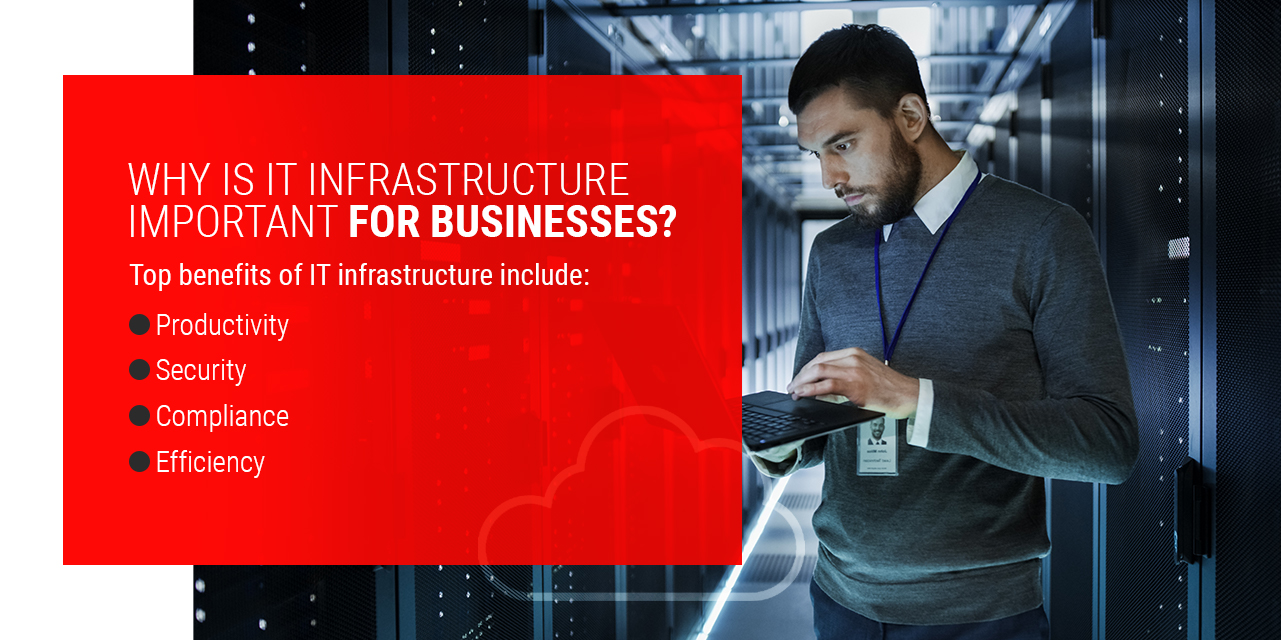- What Is IT Infrastructure?
- Why Is IT Infrastructure Important for Businesses?
- Why IT Infrastructure Needs Managed Service Providers
Your organization’s IT infrastructure is the backbone of your operations. Every component matters, from your network security package to your choice of an on- or off-site data center, and this infrastructure requires a customized management approach. Discover more about the benefits of IT infrastructure and why it’s critical for businesses to maintain with this article.
What Is IT Infrastructure?
IT infrastructure encompasses each independent part of your IT services, including hardware, networks, servers and software. It connects employees and departments to each other while facilitating back-end operations and online communication with customers or clientele.
IT infrastructure works by each component feeding into the next, sometimes combining on-site and cloud-based deployment. Effective infrastructure should be secure, scalable and optimized for your team’s specific needs.

Why Is IT Infrastructure Important for Businesses?
The more robust your IT infrastructure, the better it will meet your and your clients’ needs. Top benefits of IT infrastructure include:
- Productivity: A strong IT infrastructure will support maximum team productivity and influence how you engage and operate with each other. Features like low-latency networks work to reduce downtime and minimize delayed responses, streamlining communication between teams.
- Security: Experts project cybercrimes will amass $10.5 trillion annually by 2025, including phishing schemes, malware, ransomware and Denial of Service (DoS) attacks on small and large companies alike. While even the most basic IT infrastructure should offer protection against these common offenders, comprehensive infrastructure management can predict and avoid security risks to minimize fallout. Security also applies to your company’s data management, recovery and backup storage.
- Compliance: Nearly every industry — especially those in the health care and financial sectors and organizations dealing with sensitive consumer data — has a set of standards and compliance regulations to follow. Guidelines like those from the International Organization for Standardization (ISO) and the Center for Internet Security (CIT) exist to protect consumer data and company systems from breaches and unauthorized access or misuse. Failure to comply may result in fines or legal action.
- Efficiency: Streamlined operations and stable connections are essential for supporting customers online and powering intuitive website algorithms. Even small disruptions or slow speeds, especially during high-demand hours or surges, could result in loss of sales or delayed customer management.
Why IT Infrastructure Needs Managed Service Providers
While it is possible to manage your organization’s IT infrastructure with your own in-house resources, using a managed service provider can have significant company-wide benefits. A comprehensive IT infrastructure management plan incorporates every aspect of your organization, including systems, professionals, processes, data and facilities, to meet your specific demands and identify how operations relate to your company goals.
When you work with a trusted IT management provider, you can expect the following benefits and more:
Enhanced Security
Cybercrimes typically evolve faster than companies with unmanaged IT infrastructures can address them, leaving many organizations more vulnerable to attacks than they realize. Because security threats grow and evolve so quickly, it’s all too easy for busy companies to overlook emerging risks. An IT management team can bridge this gap by offering proactive, intuitive threat protection for your company with sophisticated technology and detection methods.
The right provider can protect your company through things like:
- Early threat detection and response.
- Threat isolation and removal.
- Data leakage prevention.
- Data access governance.
- Secure information-sharing.
Dedicated Professionals
An IT infrastructure management service provider’s sole objective is to keep your operations stable and secure 24/7, no matter the task. This around-the-clock support ensures no customer request goes unnoticed and that any downed servers, malfunctioning hardware or impending security risks are corrected quickly.
Infrastructure management service providers don’t have to test new processes or equipment — they already know what works and what doesn’t. They’ve tested the processes and have the industry knowledge to evolve their skills and set of approaches as needed.
While having an on-staff, on-site IT professional on your team is always an asset, your organization can benefit from the additional support, especially after business hours or during highly complex problems requiring a multifaceted approach.
Flexible Pricing
Because you can choose which management services you need and which you don’t, you can build a comprehensive package that meets your unique requirements without paying for unnecessary services. Working with a third-party management team means you pay only for what your business demands without the overhead investment in new equipment or training.
If you don’t already have an in-house IT department, third-party management services spare you the additional expenses of hiring, training and maintaining one.
Maximum Scalability
Scalability is a crucial component of every organization’s IT infrastructure, from small businesses to mega-corporations. Your operations need to grow and evolve as you do. A lack of scalable processes could cause significant delays and costs during transitions, ultimately leaving you unprepared to manage security risks or customer needs.
By outsourcing your IT infrastructure management to a third party, you can leverage their existing resources to meet your needs as they change.
Up-To-Date Technology
Successful IT infrastructure should include up-to-date technology and processes to stay relevant and capable in today’s fast-changing cyberworld. At the very least, your infrastructure shouldn’t include anything broken or outdated enough to leave you vulnerable to security risks or downtime.
Up-to-date IT infrastructure means:
- Faster connection speeds.
- More website and server stability.
- Fewer server crashes or low-latency lag.
- Increased storage space for data and software.
- More comprehensive data storage and support.
- Increased security against new and emerging cyberthreats.
- Cost savings by optimizing existing resources and automating or upgrading where possible.
- Compliance with industry-wide and federal standards and regulations.
- Flexible access to more services via the cloud.
- The ability to shift to a distributed workforce.
IT infrastructure management service providers will analyze all your existing processes, systems and hardware solutions to determine where improvements can be made for better speeds, enhanced security or lower costs. Many of these areas are easy to overlook, especially when you’re busy running your business. A third-party provider won’t let anything slip through the cracks, which can give you more peace of mind that your operations are functioning as they should.
Contact Focus Technology for IT Solutions
Focus Technology has more than two decades of experience providing organizations like yours with top IT solutions and infrastructure management. With a dedication to flexibility, collaboration and growth, we work with your team to identify crucial operation areas that meet your specific requirements.
Learn more about our managed IT services and contact us to schedule your free tech assessment today!

